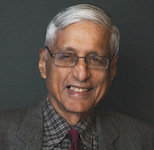The BBC raids and India today: Questions even a child could ask
Is it really that difficult, in today’s India, to speak out? Is it that tough, even in private conversation, just to utter the simple truth that our current government refuses, in Parliament or outside, to answer the most obvious of questions? Questions like, “Was it merely a ‘survey’ (to employ the official word) when, in the course of continuous raids, scores if not hundreds of the BBC’s journalists in India (most of them Indian in origin) were asked to hand over their phones and computers for copying?”
Is it too risky to say that the government seems to be turning off the switches of India’s democratic institutions? Being a student of history, I am reminded of earlier incidents by today’s happenings. On June 9, 1942, for example (more than 80 years ago, that is), by when Gandhi had begun voicing his intention to launch the Quit India movement, Louis Fischer, an American journalist visiting India, marvelled at what he thought was Gandhi’s audacity. For, by then, the mighty US had entered the Second World War as England’s ally.
Fischer told Gandhi: “If you look at this in its historic perspective, you are doing a novel and remarkable thing — you are ordaining the end of an empire.” Replied Gandhi, “Even a child can do that.” (Collected Works of Mahatma Gandhi, vol. 82, Old Series.)
It was the most obvious thing, Gandhi was saying in 1942, to ask the British to quit the business of commanding India. Even a child could do it, he said. Today, 81 years later, even a child in India can similarly ask, “Why are the leaders of our government not answering simple questions?”
And since hundreds of thousands of young Indians aim today to study in this or that nation across the world, they should be concerned that talk of the raids on the BBC’s offices in India is major news in many countries. Thus, America’s CNN reports: “Indian tax officials continued their search of the BBC’s offices in New Delhi and Mumbai for the third consecutive day, two sources with knowledge of the matter told CNN, weeks after the country banned a documentary from the British broadcaster that was critical of Prime Minister Narendra Modi’s alleged role in deadly riots more than 20 years ago.”
Adds CNN: “The searches come nearly a month after the Indian government said it banned the two-part documentary, India: The Modi Question, from being aired in the country and used ‘emergency powers’ to block clips of the film from circulating on social media domestically. Twitter and YouTube complied with the order, the government said. The documentary revives the most controversial chapter of the Indian leader’s political career, when he was the chief minister of the western state of Gujarat in 2002.”
It is no secret that a great many Indians now see the world as their home. They are unwilling to restrict their thoughts, hopes, and activities to places within the map of India. Reports of proceedings by New Delhi against a global media giant like the BBC — a giant, moreover, who in many eyes is friendly, reliable, and trustworthy — will not make life easier for the millions of Indians who presently live abroad or hope soon to do so.
For more than seven post-independence decades, India has persisted with democratic institutions and thereby impressed the world, which expected India’s diversity and inequalities to deflate the tyres of the immense convoy of our democratic vehicles. That convoy continues to roll forward, and its progress, though uneven, continues to make an impact.
At times, countries that reject democracy also impress the world’s mind with successes in rocketry, bomb-making, and such. With us, it’s different. It is in debate and discussion that Indians have always felt at home. In our long history, we may not spot too many long periods when democracy was actually displayed. Yet, that record has never dulled India’s millennia-old appetite for argument and debate. By the same token, it is hard to imagine Indians entering with any enthusiasm a global race for success with autocracy.
Surely, the Press Club of India was right in holding that the raids on the BBC’s offices “will damage the reputation and image of India as the world’s largest democracy”. Many will agree with the Press Club’s view that “this latest instance appears to be a clear-cut case of vendetta, coming within weeks of a documentary aired by the BBC”, and with the Club’s exhortation to the government to “restrain its agencies from misusing its powers in order to intimidate the media”.
Indians love an argument and are bored by uniformity. Those who are aware of the Gandhi-Tagore debate of 1920-21, which newspapers and periodicals took to all corners of India at a crucial moment of the freedom struggle, also know of the enrichment that debate produced. Likewise, the intellectual and political story of 20th-century India would be dull without the sharp Ambedkar-Gandhi debates of the 1930s, or without the debates and discussions involving Gandhi, Jinnah, Nehru, Bose, Patel, Azad, Rajagopalachari, M N Roy and others.
Students of politics, debating eloquence, and democracy would similarly profit from a study of the post-independence interventions in Parliament or the public square by, among others, J P, Lohia, Kripalani, Jagjivan Ram, Minoo Masani, Aruna Asaf Ali, Amrit Kaur, Hiren Mukherjee, Syama Prasad Mookerjee, A K Gopalan, Piloo Mody, Vajpayee, and Advani.
Free, vigorous debate is part of India’s essence, and the death of debate will turn India into a fossil. Pointing out the obvious, such as the current elimination of Q and A when it comes to the leaders of our government, can be the first response of any child or adult.
